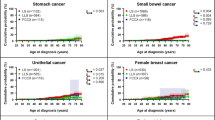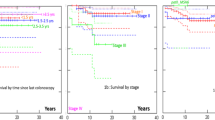Abstract
Background
Complex interactions among endogenous and exogenous factors influence the incidence of colorectal cancer (CRC). Germline mutations in mismatch repair (MMR) genes causing Lynch syndrome (LS) are major endogenous factors. The exogenous factor, alcohol consumption, is potentially associated with CRC incidence among patients with LS. However, insufficient data are available to determine whether alcohol consumption influences the time of the first onset of CRC associated with sex, MMR gene mutations, and anatomical tumor site.
Methods
Among 316 patients with LS identified in a Japanese LS cohort, we included 288 with data on age, sex, proband status, alcohol status, smoking status, tumor location, and MMR gene mutations. Multivariable analysis assessed the association of alcohol consumption with earlier onset of the first CRC.
Results
Ever drinkers were associated with higher risk of the first onset of CRC than never drinkers (HR 1.54, 95%CI 1.14–2.07, P = 0.004). The association of the first onset of CRC with alcohol consumption was stronger in men, carriers of pathogenic MLH1 and MSH2 mutations (vs those with pathogenic MSH6, PMS2 and EPCAM mutations), and tumors in the proximal colon cancer (vs distal colon and rectal cancer).
Conclusions
Alcohol consumption was associated with earlier onset of the first CRC in Japanese LS cohort. The association was stronger in men, carriers of pathogenic MLH1 and MSH2 mutations, and tumors located in the proximal colon. Our findings illuminate the mechanism of LS-associated carcinogenesis and serve as a recommendation for discontinuing or ceasing alcohol consumption.




Similar content being viewed by others
Change history
19 April 2022
A Correction to this paper has been published: https://doi.org/10.1007/s10147-022-02170-4
References
Akimoto N, Ugai T, Zhong R et al (2021) Rising incidence of early-onset colorectal cancer—a call to action. Nat Rev Clin Oncol 18:230–243
Fujiyoshi K, Chen Y, Haruki K et al (2020) Smoking status at diagnosis and colorectal cancer prognosis according to tumor lymphocytic reaction. JNCI Cancer Spectr 4:40
Lynch HT, Snyder CL, Shaw TG et al (2015) Milestones of Lynch syndrome: 1895–2015. Nat Rev Cancer 15:181–194
Tanakaya K (2019) Current clinical topics of Lynch syndrome. Int J Clin Oncol 24:1013–1019
Sinicrope FA (2018) Lynch syndrome-associated colorectal cancer. N Engl J Med 379:764–773
Fujiyoshi K, Bruford EA, Mroz P et al (2021) Opinion: standardizing gene product nomenclature—a call to action. Proc Natl Acad Sci USA. https://doi.org/10.1073/pnas.2025207118
Chika N, Eguchi H, Kumamoto K et al (2017) Prevalence of Lynch syndrome and Lynch-like syndrome among patients with colorectal cancer in a Japanese hospital-based population. Jpn J Clin Oncol 47:108–117
Møller P, Seppälä T, Bernstein I et al (2017) Cancer incidence and survival in Lynch syndrome patients receiving colonoscopic and gynaecological surveillance: first report from the prospective Lynch syndrome database. Gut 66:464–472
Bonadona V, Bonaïti B, Olschwang S et al (2011) Cancer risks associated with germline mutations in MLH1, MSH2, and MSH6 genes in Lynch syndrome. JAMA 305:2304–2310
Giardiello FM, Allen JI, Axilbund JE et al (2014) Guidelines on genetic evaluation and management of Lynch syndrome: a consensus statement by the US Multi-society Task Force on colorectal cancer. Am J Gastroenterol 109:1159–1179
Nakayama Y, Iijima T, Inokuchi T et al (2021) Clinicopathological features of sporadic MSI colorectal cancer and Lynch syndrome: a single-center retrospective cohort study. Int J Clin Oncol 26:1881–1889
Dowty JG, Win AK, Buchanan DD et al (2013) Cancer risks for MLH1 and MSH2 mutation carriers. Hum Mutat 34:490–497
Signoroni S, Piozzi GN, Ricci MT et al (2020) Risk factors for metachronous colorectal cancer in Lynch syndrome patients: a registry-based observational mono-institutional study cohort. Int J Clin Oncol 25:1644–1652
Mehta RS, Song M, Nishihara R et al (2017) Dietary patterns and risk of colorectal cancer: analysis by tumor location and molecular subtypes. Gastroenterology 152:1944-1953.e1
Burn J, Sheth H, Elliott F et al (2020) Cancer prevention with aspirin in hereditary colorectal cancer (Lynch syndrome), 10-year follow-up and registry-based 20-year data in the CAPP2 study: a double-blind, randomised, placebo-controlled trial. Lancet 395:1855–1863
Jayasekara H, MacInnis RJ, Room R et al (2016) Long-term alcohol consumption and breast, upper aero-digestive tract and colorectal cancer risk: a systematic review and meta-analysis. Alcohol Alcohol 51:315–330
Fedirko V, Tramacere I, Bagnardi V et al (2011) Alcohol drinking and colorectal cancer risk: an overall and dose-response meta-analysis of published studies. Ann Oncol 22:1958–1972
Cho E, Smith-Warner SA, Ritz J et al (2004) Alcohol intake and colorectal cancer: a pooled analysis of 8 cohort studies. Ann Intern Med 140:603–613
McNabb S, Harrison TA, Albanes D et al (2020) Meta-analysis of 16 studies of the association of alcohol with colorectal cancer. Int J Cancer 146:861–873
Guinney J, Dienstmann R, Wang X et al (2015) The consensus molecular subtypes of colorectal cancer. Nat Med 21:1350–1356
Mima K, Cao Y, Chan AT et al (2016) Fusobacterium nucleatum in colorectal carcinoma tissue according to tumor location. Clin Transl Gastroenterol 7:e200
Miguchi M, Hinoi T, Tanakaya K et al (2018) Alcohol consumption and early-onset risk of colorectal cancer in Japanese patients with Lynch syndrome: a cross-sectional study conducted by the Japanese Society for Cancer of the Colon and Rectum. Surg Today 48:810–814
Dashti SG, Buchanan DD, Jayasekara H et al (2017) Alcohol consumption and the risk of colorectal cancer for mismatch repair gene mutation carriers. Cancer Epidemiol Biomark Prev 26:366–375
Watson P, Ashwathnarayan R, Lynch HT et al (2004) Tobacco use and increased colorectal cancer risk in patients with hereditary nonpolyposis colorectal cancer (Lynch syndrome). Arch Intern Med 164:2429–2431
Diergaarde B, Braam H, Vasen HF et al (2007) Environmental factors and colorectal tumor risk in individuals with hereditary nonpolyposis colorectal cancer. Clin Gastroenterol Hepatol 5:736–742
Winkels RM, Botma A, Van Duijnhoven FJB et al (2012) Smoking increases the risk for colorectal adenomas in patients with Lynch syndrome. Gastroenterology 142:241–247
Brinkman GL, Coates EO Jr (1963) The effect of bronchitis, smoking, and occupation on ventilation. Am Rev Respir Dis 87:684–693
Akhter M, Kuriyama S, Nakaya N et al (2007) Alcohol consumption is associated with an increased risk of distal colon and rectal cancer in Japanese men: the Miyagi Cohort Study. Eur J Cancer 43:383–390
Park S-Y, Wilkens LR, Setiawan VW et al (2019) Alcohol intake and colorectal cancer risk in the multiethnic cohort study. Am J Epidemiol 188:67–76
Seppälä TT, Latchford A, Negoi I et al (2021) European guidelines from the EHTG and ESCP for Lynch syndrome: an updated third edition of the Mallorca guidelines based on gene and gender. Br J Surg 108:484–498
Cerretelli G, Zhou Y, Müller MF et al (2021) Ethanol-induced formation of colorectal tumours and precursors in a mouse model of Lynch Syndrome. J Pathol. https://doi.org/10.1002/path.5796
Yamauchi M, Lochhead P, Morikawa T et al (2012) Colorectal cancer: a tale of two sides or a continuum? Gut 61:794–797
Lynch HT, de la Chapelle A (1999) Genetic susceptibility to non-polyposis colorectal cancer. J Med Genet 36:801–818
Hendriks YMC, Wagner A, Morreau H et al (2004) Cancer risk in hereditary nonpolyposis colorectal cancer due to MSH6 mutations: impact on counseling and surveillance. Gastroenterology 127:17–25
Lipkin SM, Wang V, Jacoby R et al (2000) MLH3: a DNA mismatch repair gene associated with mammalian microsatellite instability. Nat Genet 24:27–35
Taniguchi F, Tanakaya K, Sugano K et al (2020) Adequacy evaluation of the annual colonoscopic surveillance and individual difference of disease phenotypes in Lynch syndrome. Jpn J Clin Oncol 50:635–642
Otani T, Iwasaki M, Yamamoto S et al (2003) Alcohol consumption, smoking, and subsequent risk of colorectal cancer in middle-aged and elderly Japanese men and women: Japan Public Health Center-based prospective study. Cancer Epidemiol Biomark Prev 12:1492–1500
Acknowledgements
Kenta Murotani, Ph.D., Professor, Biostatistics Center, Kurume University, contributed to the statistical analyses and their interpretation. We thank Edanz Group (https://www.jp.edanz.com/ac) for editing a draft of this manuscript.
Author information
Authors and Affiliations
Contributions
All authors contributed to review and revision. KF, TS, and FF: developed the main concept and designed the study. KF and TS: responsible for collection of data, including medical information and surgical and histopathological characteristics. KF and TS: performed data analysis and interpretation. KF: drafted the manuscript. KF, TS, FF, AC, KA, AT, MY, KT, HI, KK, SI, MM, KH, YM, TI, NT, YA, and KS: contributed to editing and critical revision of important intellectual content.
Corresponding author
Ethics declarations
Conflicts of interest
The other authors declare that they have no conflicts of interest.
Additional information
Publisher's Note
Springer Nature remains neutral with regard to jurisdictional claims in published maps and institutional affiliations.
Supplementary Information
Below is the link to the electronic supplementary material.
About this article
Cite this article
Fujiyoshi, K., Sudo, T., Fujita, F. et al. Risk of first onset of colorectal cancer associated with alcohol consumption in Lynch syndrome: a multicenter cohort study. Int J Clin Oncol 27, 1051–1059 (2022). https://doi.org/10.1007/s10147-022-02148-2
Received:
Accepted:
Published:
Issue Date:
DOI: https://doi.org/10.1007/s10147-022-02148-2




